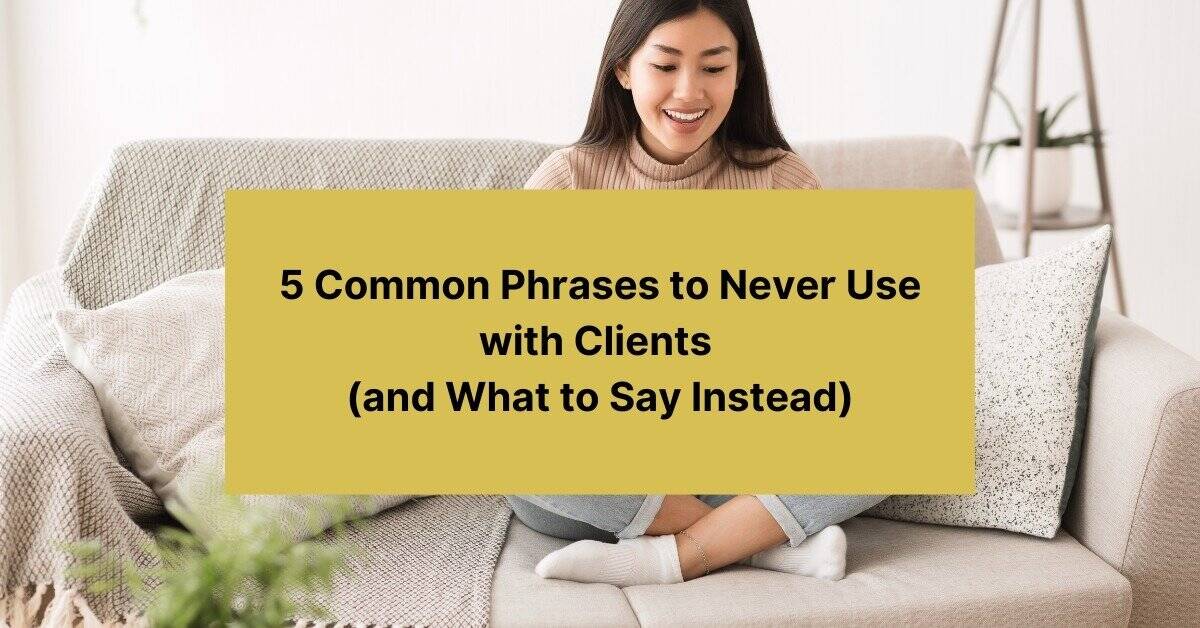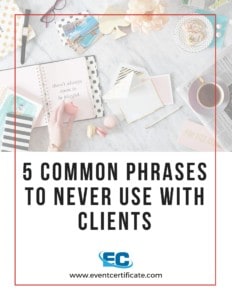
Communication is one of the most undervalued tools in business, and one of the most powerful. The way you speak to your clients can be the reason they come back for more, or the reason they quietly walk away and never return. Let’s explore some phrases to never use to clients.
Whether you’re a wedding planner, coach, general contractor, therapist, or any service-based business owner, your ability to build trust through conversation can make or break your reputation.
Clients aren’t just buying your service. They’re investing in your expertise, your guidance, and your professionalism. And that starts with how you speak to them—even when things go wrong.
So, if you’re looking to improve your client relationships and build loyalty that leads to referrals, repeat bookings, and 5-star reviews, here are five phrases to cut from your conversations immediately, and what to say instead.
“It’s not my fault”
Why this doesn’t work: This phrase deflects responsibility and immediately creates friction. Even if you’re not the one at fault, say, the supplier was late or the client misunderstood a timeline, stating it this way makes you sound dismissive and unhelpful. It also implies that you’re more concerned with blame than with finding a solution.
What to say instead: “I completely understand how frustrating this is. While this issue was outside of my control, I’m going to reach out to [vendor/supplier/client] right away to see how we can make it right.”
If the client is at fault, this isn’t the time to call them out. Instead, follow up in writing to clarify the situation and confirm next steps. It keeps everyone accountable, without adding fuel to the fire.
“You’re wrong”
Why this doesn’t work: This phrase can come across as combative and invalidating, even if you are right. When a client feels unheard or dismissed, their trust in your expertise quickly erodes.
What to say instead: “That’s one perspective, and I really appreciate you sharing it. Would you be open to another approach that’s worked well for past clients?”
You can correct gently, without making someone feel foolish. That’s the mark of a strong communicator.
“I’ll try.”
Why this doesn’t work: This may sound polite, but it communicates uncertainty or a lack of commitment. When a client makes a request, especially during a stressful project, they want to hear confidence, not hesitation.
What to say instead: “Let me look into it and follow up with you by [insert day or time]. If there’s anything else you need in the meantime, I’m here to help.”
Even if you’re unsure whether something can be done, showing initiative is far more reassuring than a lukewarm “I’ll try.”
“No offense, but”
Why this doesn’t work: Any statement following these words WILL be offensive. The fact that you’ve stated that you meant no offense does not mean that you will not hurt their feelings. The best option is not to be offensive at all. Disagreements do occur, and you are allowed to express your feelings clearly to your client, however, this should not cause that person to feel attacked in any way.
What to say instead: “I totally understand your vision. Here’s another option that might be a better fit based on what we’ve discussed”.
Kindness doesn’t mean being a pushover. You can redirect with professionalism—and preserve the relationship at the same time.
“Calm down”
Why this doesn’t work: Even with the best intentions, this phrase often has the opposite effect. When someone is upset, telling them to calm down can make them feel belittled or dismissed. And let’s be honest, has anyone ever calmed down because someone told them to?
What to say instead: “I hear you, and I want to understand what’s going on. Let’s figure out the best way to move forward together.”
Let the client vent. When they feel heard, they’ll naturally begin to de-escalate. Of course, if someone becomes abusive or crosses a line, it’s okay to set boundaries or pause the conversation.
Final Thoughts: Phrases to Never Use with Clients
Every interaction with a client is an opportunity to reinforce your professionalism, your values, and your brand. By replacing these common but damaging phrases with more thoughtful language, you build trust, and trust is what drives retention, referrals, and long-term success.
You don’t have to get it perfect every time. But you do have to be intentional.
Want to strengthen your client communications even further? Check out my Client Welcome & Offboarding Templates, designed to help you set expectations, avoid miscommunication, and create a client experience that keeps them coming back.

Every good conversation starts with good listening.


